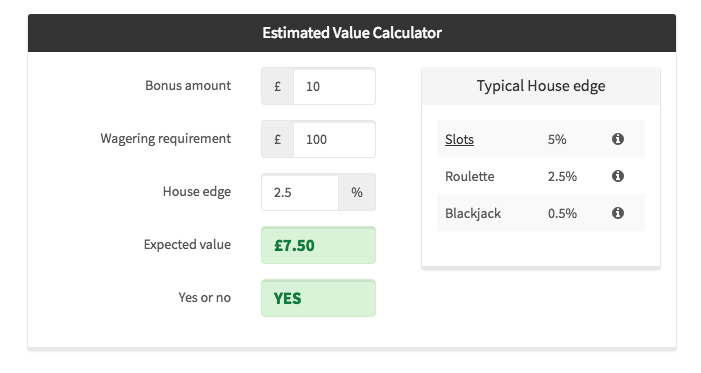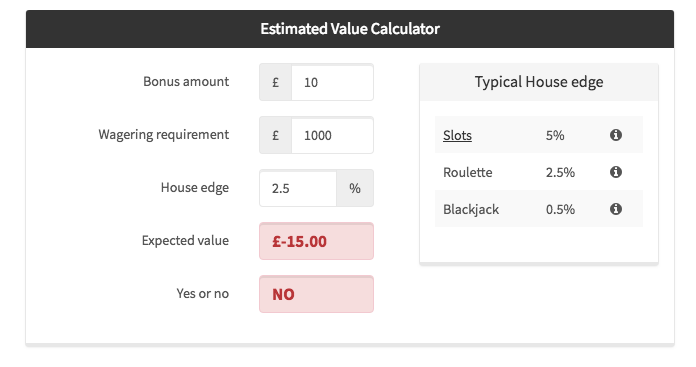An important aspect of advantage play is two terms known as “Expected Value” or “Estimated Value” (often abbreviated to EV) and “Variance”. You will have seen them banded about the Oddsmonkey forums and might not understand what people are on about.
So hopefully this post should leave you a little wiser about what they mean and how they relate to casino offers.
If you’re new here and want to read up on Advantage Play, read my explainer page here.
The House Edge And Expected Value
To understand expected value a bit better we need to look at the inherent bias deliberately built into casino games usually known as the “House Edge”.
All card and table games have them so that over infinite amounts of hands/spins the casino makes a profit no matter what. Blackjack tends to have the lowest house edge usually at about 0.5% whereas Roulette comes in around 2.5% and slots can have huge edges ranging between 5-10%.
Taking Roulette as an example for expected value, if we were to wager £10 once through this game you would expect to end up with £9.75.
Why?
Well the rough mathematics is quite simple (the real maths is much more complicated but that’s for someone else to explain):
2.5% is 0.025 as a decimal
0.025 x £10 = £0.25
£10 – £0.25 = £9.75 expected value
As you can see, when we have to go through large wagering requirements (in this scenario 10x our bonus amount of £10) the house edge works its magic and erodes the “expected value” of that bonus as we are playing against a 2.5% edge every time we spin.
0.025 x £100 = £2.50
£10 – £2.50 = £7.50 expected value
 In the examples above, we would still expect to make a profit from our casino bonus when played on a game with a house edge of 2.5%.
In the examples above, we would still expect to make a profit from our casino bonus when played on a game with a house edge of 2.5%.
When an offer leaves you with an expected profit it is known as “Positive EV”.
However, if the wagering requirements are too large we end up in a situation where we would generally expect to lose money.
When someone describes an offer as “Negative EV” this is what they mean. See the example below, if we had to wager our £10 bonus 100 times (£1000) we would expect to lose £15.
0.025 x £1000 = £25
£10 – £25 = -£15 expected value
 If you want to use a simulator (which is a lot more advanced that a simple EV calculator) to determine the EV of your casino offer then I would recommend Bonus Chum, a free version of which can be found here.
If you want to use a simulator (which is a lot more advanced that a simple EV calculator) to determine the EV of your casino offer then I would recommend Bonus Chum, a free version of which can be found here.
What Does Variance Mean?
Now we know an expected value of an offer is, what does variance have to do with it? Well it’s probably best if I illustrate this with another example.
Let’s say Bill and his mate Ben (possibly the Flower Pot Men) have a £1 coin.
Bill says to Ben “I’ve got a game we can play, every time the coin lands on Heads I get £1 and every time it lands on Tails you get £1 and we stop when one of us has lost/won £10.”
Ben likes the sound of this and fancies his chances. He inspects the coin to make sure Bill hasn’t been up to his old tricks. It’s a totally normal pound coin and he is happy to play.
Now, if we predicted this game using expected value, neither of them should get to £10 loss/profit.
As it is a 50/50 game with no edge, the coin should land Heads 50% of the time and Tails should land the other 50%.
They begin the game, Ben watches in astonishment as time after time the coin lands on heads until he’s lost his £10 and Bill stops the game. In his fury, he asks Bill to flip it again to prove it’s not rigged. This time it lands on tails.
Annoyed and flabbergasted Ben storms off to find a tenner to give to his joyous potted friend.
So what happened here?
Variance.
Also know by other names such as “luck”, or “volatility”. It’s the fact that a game is not always going to behave in the way you would expect.
We all know that if you flip a coin 100 times it is unlikely to end up 50 heads/50 tails, it’s usually 57 to 43 or something similar.
The point is expected value is presumed over millions of spins (or flips) so a sample as small as 100 will observe huge swings in this expectation this is what we know as variance.
How Does Variance Relate To Casino Games?
Variance explains, in mathematical terms, how likely you are to deviate from the expected house edge.
The higher the variance, the more likely it is you will end up significantly above or below the expected value for that particular offer.
For instance, Blackjack is known to be a low variance game so you shouldn’t end up wildly up from it or down from it (though it can happen!).
The highest variance games in online casinos are also the most popular; the slots.
The odds of hitting a big win are low, but when it does hit, it’s usually for huge amounts of money. It’s this variance that makes the slots so fun and exciting.
Traditional one-line, three-reel slots have the highest variance. Multi-line video slots have lower variance since you are essentially spreading your bet around.
You should always check a video slot’s pay-table to get an estimate for its variance. As feature prizes increase and line payouts decrease, variance increases.
If you want to see how a particular slot plays head over to slot catalogue which will tell you it’s RTP% (Return to Player) and its variance level.
Usually these online slots are categorised as low, medium or high variance.

Low variance slots will give you small and regular wins, medium variance will give you less frequent wins but for larger amounts, and high variance slots are simple, you will either win a large amount of money or bust out of your offer.
It’s for this reason that offers chosen by the casinos are often on high variance slots, because they know 9/10 people will bust out of the offer, often gaining them money in the process of the initial wagering.
However, it’s because of this very reason that we can reap big profits.
We will inevitably bust out of the majority of the offers attempted, however when we do manage to hit a big win, it will usually cover any losses accrued up until that point and then some!
Conclusion
Hopefully you have found this post useful in determining what advantage gamblers mean when they talk about terms such as EV (expected value) and variance.
If you would like to know more about profiting from casino offers why not read my step-by-step advantage play guide or my post on the importance of always taking free spin offers.
